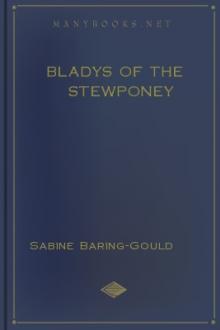The Broom-Squire - Sabine Baring-Gould (life books to read .txt) 📗

- Author: Sabine Baring-Gould
Book online «The Broom-Squire - Sabine Baring-Gould (life books to read .txt) 📗». Author Sabine Baring-Gould
"Yes you and my duty."
"Much you value either."
"I know my duty and will do it. Iver Verstage and I can never belong to each other. We know it, and we have parted forever. I have not desired to be untrue to you in heart; but I did not know what was possible and what impossible in this poor, unhappy heart of mine when I promised to love you. I did not know what love meant at the time. Mother told me it grew as a matter of course in married life, like chickweed in a garden."
"Am I gone crazed, or have you?" exclaimed Bideabout, snorting with passion. "You have parted with Iver quite so but only till after my death, which you will compass between you. I know that well enough. It was because I knew that, that I would not suffer you to give me doses of laudanum. A couple of drops, where one would suffice, and this obstruction to your loves was removed."
"No, never!" exclaimed Mehetabel, with flashing eye.
"You women are like the glassy pools in the Moor. There is a smooth face, and fair flowers floating thereon, and underneath the toad and the effect, the water-rat and festering poison. I shall know how to drive out of you the devil that possesses you this spirit of rebellion and passion for Iver Verstage."
"You may do that," said Mehetabel, recovering her self-mastery, "if you will be kind, forbearing, and gentle."
"It is not with kindness and gentleness that I shall do it," scoffed the Broom-Squire. "The woman that will not bend must be broken. It is not I who will have to yield in this house I, who have been master here these twenty years. I shall know how to bring you to your senses."
He was in foaming fury. He shook his fist, and his short hair bristled.
Mehetabel shrank from him as from a maniac.
"You have no need to threaten," she said, with sadness in her tone. "I am prepared for anything. Life is not so precious to me that I care for it."
"Then why did you crawl out of the marsh?"
She looked at him with wide-open eyes.
"Make an end of my wretchedness if you will. Take a knife, and drive it into my heart. Go to your closet, and bring me that poison you have there, and pour it between my lips. Thrust me, if you will, into the Marsh. It is all one to me. I cannot love you unless you change your manners of thought and act and speech altogether."
"Bah!" sneered he, "I shall not kill you. But I shall make you understand to fear me, if you cannot love me." He gripped her wrist. "Whether alive or dead, there will be no escape from me. I will follow you, track you in all you do, and if I go underground shall fasten on you, in spirit, and drag you underground as well. When you married me you became mine forever."
A little noise made both turn.
At the door was Sally Rocliffe, her malevolent face on the watch, observing all that passed.
"What do you want here?" asked the Broom-Squire.
"Nuthin', Jonas, but to know what time it is. Our clock is all wrong when it does go, and now, with the cold and snow, I suppose, it has stopped altogether."
Sally looked at the clock that stood in the comer, Jonas turned sharply on his heel, took his hat, and went forth into the backyard of his farm.
"So," said Mrs. Rocliffe, "my brother is in fear of his life of you. I know very well how he got the shot in his elbow. It was not your fault that it did not lodge in his head. And now he dare not take his medicine from your hands lest you should put poison into it. That comes of marrying into a gallows family."
Then slowly she walked away.
Mehetabel sank into the window seat.
However glorious the snow-clad, sunlit world might be without it was nothing to her. Within her was darkness and despair.
She looked at her wrist, marked with the pressure of her husband's fingers. No tears quenched the fire in her eyes. She sat and gazed stonily before her, and thought on nothing. It was as though her heart was frozen and buried under snow; as though her eyes looked over the moor, also frozen and white, but without the sun flooding it. Above hung gray and threatening clouds.
Thus she sat for many minutes, almost without breathing, almost without pulsation.
Then she sprang to her feet with a sob in her throat, and hastened about the house to her work. There was, as it were, a dark sea tumbling, foaming, clashing within her, and horrible thoughts rose up out of this sea and looked at her in ghostly fashion and filled her with terror. Chief among these was the thought that the death of Jonas could and would free her from this hopeless wretchedness. Had the bullet indeed entered his head then now she would have been enduring none of this insult, none of these indignities, none of this daily torture springing out of his jealousy, his suspicion, and his resentfulness.
And at the same time appeared the vision of Iver Verstage. She could measure Jonas by him. How infinitely inferior in every particular was Jonas to the young painter, the friend of her childhood.
But Mehetabel knew that such thoughts could but breed mischief. They were poison germs that would infect her own life, and make her not only infinitely wretched but degrade her in her own eyes. She fought against them. She beat them down as though she were battling with serpents that rose up out of the dust to lash themselves around her and sting her. The look at them had an almost paralyzing effect. If she did not use great effort they would fascinate her, and draw her on till they filled her whole mind and lured her from thought to act.
She had not been instructed in much that was of spiritual advantage when a child in the Sunday-school. The Rector, as has already been intimated, had been an excellent and kindly man, who desired to stand well with everybody, and who was always taking up one nostrum after another as a panacea for every spiritual ill. And at the time when Matabel was under instruction the nostrum was the physical geography of the Holy Land. The only thing the parson did not teach was a definite Christian belief, because he had entered into a compromise with a couple of Dissenting farmers not to do so, and to confine the instruction to such matters as could not be disputed. Moreover, he was, himself, mentally averse to everything that savored of dogma in religion. He would not give his parishioners the Bread of Life, but would supply them with any amount of stones geographically tabulated according to their strata.
However, Matabel had acquired a clear sense of right and wrong, at a little dame's school she had attended, as also from Mrs. Verstage; and now this definite knowledge of right and wrong stood her in good stead. She saw that the harboring of such thoughts was wrong, and she therefore resolutely resisted them. "He said," she sighed, when the battle was over, "that he would follow me through life and death, and finally drag me underground. But, can he be as bad as his word?"
CHAPTER XXIX.
A HERALD OF STRIFE.
The winter passed without any change in the situation. Iver did not come home for Christmas, although he heard that his mother was failing in health and strength. There was much amusement in Guildford, and he reasoned that it would be advantageous to his business to take part in all the entertainments, and accept every invitation made him to the house of a pupil. Thursley was not so remote but that he could go there at any time. He was establishing himself in the place, and must strike root on all sides.
This was a disappointment to Mrs. Verstage. Reluctantly she admitted that her health was breaking down, and that, moreover, whilst Simon remained tough and unshaken. The long-expected and hoped for time when Iver should become a permanent inmate of the house, and she would spend her declining years in love and admiration, had vanished to the region of hopes impossible of fulfilment.
Simon Verstage took the decline of his wife's powers very philosophically. He had been so accustomed to her prognostications of evil, and harangues on her difficulties, that he was case-hardened, and did not realize that there was actual imminence of a separation by death.
"It's all her talk," he would say to a confidential friend; "she's eighteen years younger nor me, and so has eighteen to live after I'm gone. There ain't been much took out of her: she's not one as has had a large family. There was Iver, no more; and women are longer-lived than men. She talks, but it's all along of Polly that worrits her. Let Polly alone and she'll get into the ways of the house in time; but Sanna be always at her about this and about that, and it kinder bewilders the wench, and she don't know whether to think wi' her toes, and walk wi' her head."
In the Punch-Bowl the relations that subsisted between the Broom-Squire and his wife were not more cordial than before. They lived in separate worlds. He was greatly occupied with his solicitor in Godalming, to whom he was constantly driving over. He saw little of Mehetabel, save at his meals, and then conversation was limited on his part to recrimination and sarcastic remarks that cut as a razor. She made no reply, and spoke only of matters necessary. To his abusive remarks she had no answer, a deepening color, a clouding eye showed that she felt what he said. And it irritated the man that she bore his insolence meekly. He would have preferred that she should have retorted. As it was, so quiet was the house that Sally Rocliffe sneered at her brother for living in it with Mehetabel, "just like two turtle doves,--never heard in the Punch-Bowl of such a tender couple. Since that little visit to the Moor you've been doin' nothin' but billin and cooin'." Then she burst into a verse of an old folks song, singing in harsh tones--
"A woman that hath a bad husband, I find
By scolding won't make him the better.
So let him be easy, contented in mind,
Nor suffer his foibles to fret her.
Let every good woman her husband adore,
Then happy her lot, though t be humble and poor.
We live like two turtles, no sorrows we know,
And, fair girl! mind this when you marry."
"What happens, in my house is no concern of yours, Sally," Jonas would answer sharply. "If some folk would mind their own affairs they wouldn't be all to sixes and sevens. You look out that you don't get into trouble yet over that foolish affair of Thomas and the Countess. I don't fancy you've come to the end of that yet."
So the winter passed, and spring as well, and then came summer, and just before the scythe cut the green swath, for the hay harvest, Mehetabel became a mother.
The child that was born to her was small and delicate, it lacked





Comments (0)